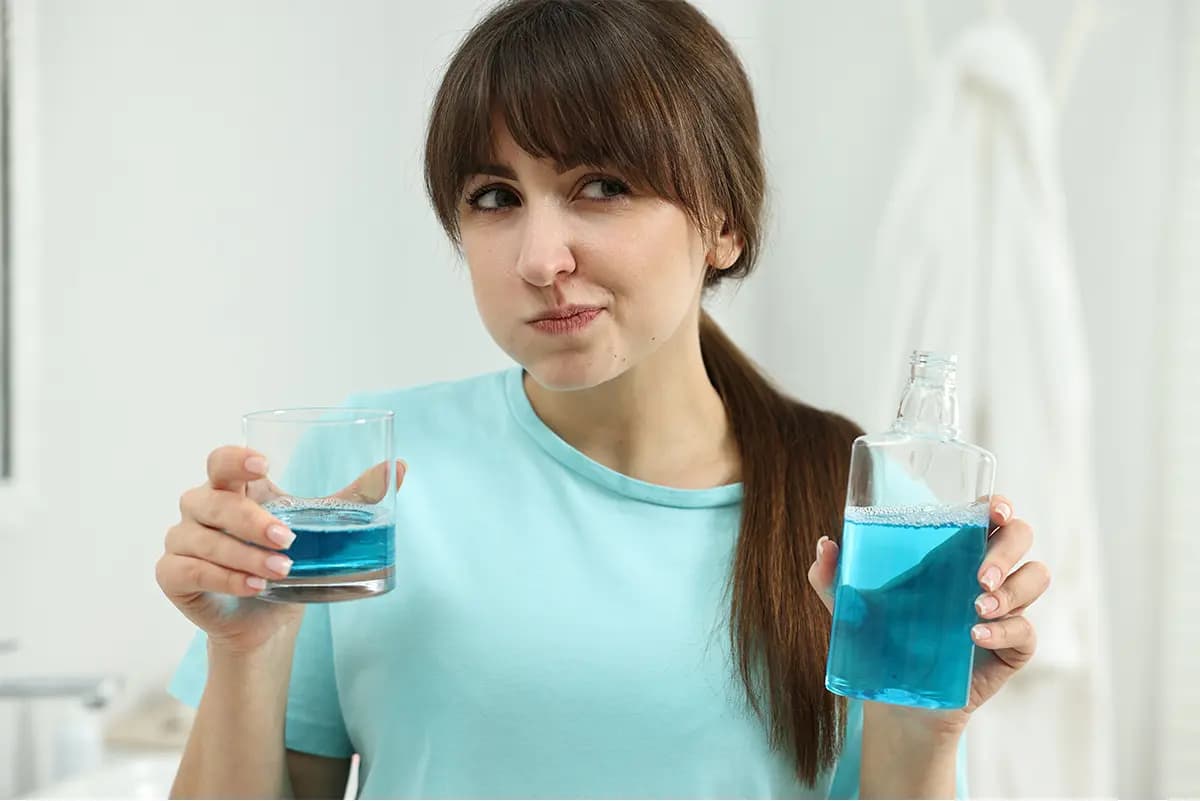
Types of Mouthwashes and Their Uses
Brushing alone is not enough to remove all the germs that accumulate on the surfaces of your gums, teeth, or other areas of the mouth. As a result, simply following this routine won’t ensure optimal oral hygiene. Additionally, food particles can become lodged between teeth, leading to problems that brushing alone cannot address.
Dentists recommend following a daily oral care routine that includes three steps: brushing, flossing, and using mouthwash. This helps maintain healthy teeth and prevents conditions such as plaque build-up, gingivitis, and other issues that can weaken teeth and cause bad breath.
You may already know that not all mouthwashes are the same. In fact, there are several types, each with different effects depending on the active ingredients they contain. Understanding the various kinds of mouthwash, their uses, and benefits can help you choose one that is most effective for your needs.
Uses of Mouthwash
Certain types of mouthwash are designed to help treat oral health issues such as tooth decay, gingivitis, plaque build-up, and bad breath. These are known as therapeutic mouthwashes, as the active ingredients they contain are intended to address these specific problems. On the other hand, some mouthwashes are only meant to provide fresh breath and do not contain any antibacterial properties.
While many therapeutic mouthwashes are available over the counter, some require a prescription, depending on their ingredients.
Active Ingredients in Mouthwashes
Mouthwashes contain different active ingredients, each serving a specific purpose. Common ingredients include:
- Cetylpyridinium chloride: Helps combat bad breath.
- Chlorhexidine: Typically available by prescription, this ingredient helps treat gingivitis and plaque.
- Essential oils: Aid in the management of gingivitis and plaque.
- Fluoride: Added to prevent tooth decay.
- Peroxide: Helps whiten teeth.
- Sodium fluoride: Reduces tooth sensitivity and prevents decay.
- Eucalyptus: Prevents gingivitis and plaque build-up.
- Hydrogen peroxide: A whitening agent that penetrates the teeth’s outer layers.
Types of Mouthwash
There are various types of mouthwash available, generally classified as either therapeutic or cosmetic based on their ingredients. Mouthwashes without germ-killing components are considered cosmetic.
Cosmetic Mouthwash: Cosmetic mouthwashes are designed to freshen the mouth and temporarily address bad breath. However, they do not kill bacteria, meaning their refreshing effect is short-lived compared to therapeutic mouthwashes.
Fluoride Mouthwash: Fluoride mouthwash helps restore damaged tooth enamel through a process known as remineralisation. This increases the teeth’s resistance to decay and erosion. Using fluoride mouthwash can help maintain the health of your teeth and reverse early signs of decay.
Fluoride is found in some natural sources, such as certain foods and water from lakes, rivers, or wells. However, these sources do not provide sufficient fluoride to protect your teeth effectively. To ensure your teeth receive the necessary fluoride concentration to prevent decay, opt for a mouthwash that contains additional fluoride, essential oils, and other ingredients to strengthen tooth enamel and prevent cavities.
Antiseptic Mouthwash: Antiseptic mouthwash is formulated to kill bacteria that cause bad breath and plaque. Some antiseptic mouthwashes contain eucalyptus oil, a powerful antibacterial ingredient that helps eliminate bacteria and prevent plaque build-up. Eucalyptus oil is derived from the eucalyptus tree (Eucalyptus globulus), native to Australia, where traditional Aboriginal people have long used it for its antiseptic properties. Antiseptic mouthwashes can help prevent plaque while providing fresh breath.
Natural Mouthwash: For those who prefer alcohol-free products, natural mouthwashes are a good alternative. These mouthwashes offer similar benefits to other types but are milder in taste and gentle on the mouth, as they do not contain alcohol. Natural mouthwashes are available in a variety of flavours to suit different preferences.
Whitening Mouthwash: In modern dental care, achieving white teeth and a bright smile is just as important as maintaining oral health. Many people seek oral care products that contain whitening ingredients. A whitening mouthwash can be a great addition to your at-home teeth-whitening routine, helping to brighten dull teeth and reduce discolouration.
Conclusion
Maintaining cavity-free, healthy teeth requires continuous care. By incorporating a mouthwash that effectively kills bacteria and germs left behind after brushing, your efforts will be more successful, and you’ll be able to keep your mouth fresher for longer.
To maximise the benefits of mouthwash, visit a dentist for a full oral health examination. You may also want to ask for recommendations on the type of mouthwash best suited to your condition.

We Are Here!
Mon-Fri from 9am to 5pm




